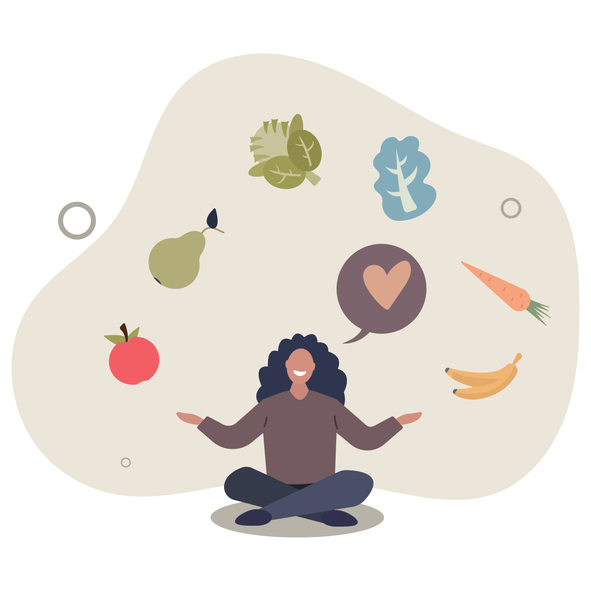After the hustle and bustle of the holiday season, it can feel hard to get back into a normal routine. School is back in session, visitors have left town, and winter is in full force. If you are feeling worn out after the busy season, you are not alone. Even if life continues to be hectic around you, there are usually moments you can grab to help settle your mind. Practicing mindfulness in your life can benefit both your physical and mental health. Eating is one of the easiest ways to be mindful—it is something everyone needs to do every day, and you have many chances to practice.
Practice Mindful Eating
Mindfulness does not need to be a complicated, rigid practice. It is meant to be flexible and to fit into the lifestyle you already have. Mindful eating can happen with a large meal or with just a single bite. Start small to practice and eventually you can share this with your friends and family.

1. Use Your Senses
Begin with your five senses. See, smell, taste, touch, and, yes, even hear the food. Start with one bite. It can be whatever food you have on hand—fruit, vegetable, leftovers from dinner. Before taking that first bite, observe your food with whatever senses are accessible to you. Take note of the color, texture, and temperature of the food. Smell it before you put it in your mouth and notice if it is what you expected. Put the bite in your mouth, but do not chew right away. What happens when it sits on your tongue? Notice the taste and texture changes in your mouth and compare these sensations to how they were in both feel and smell. When you start chewing, listen carefully. There may be a crunch or a quieter chew. As you continue chewing, and eventually swallowing, try to notice any of your five senses. Do not worry if you are having trouble at first. This can take time. The point is simply to slow down your mind and be more present while you are eating.

2. Take Your Time
Mindfulness is meant to take time. You may feel silly the first time you try mindful eating—it takes so long just to get through that first bite. However, practicing with little bites can help you establish some mindfulness habits in larger meals. Eating more mindfully, and therefore more slowly, can help with your health. Digestion starts in your mouth, so taking extra time to chew lets the food break down a bit before it hits your stomach. This can reduce the risk of bloating and discomfort that often happens when you eat too fast. Slowing down can also help you check in with your body while you are eating. People often overeat when they are distracted or not paying attention to their meals. If you take a little extra time to eat mindfully, you may be better aware of feeling hungry or full and reduce the chance of overeating.

3. Try Again!
Life happens—not every time you try to eat mindfully will be perfect. Interruptions happen, whether it be a knock at the door, a spill in the other room, or a phone call. The point of mindful eating is not to be perfect. It is simply to give you more enjoyment in food and awareness in your body. Combined, this can benefit your health in multiple ways. If you find mindfulness to be a stressful exercise, then try something different. Practice mindful eating with your first bite in the morning if you are an early bird or with a small evening bite if you are a night owl.

How ever you decide to approach mindful eating should fit into your current lifestyle. It can give you a chance to slow down and check in with your body more often. Eating mindfully can be a small time commitment for a major health payoff, ranging from improved digestion to reducing overeating. Take a breath and try it out yourself!
Did you find this blog post helpful? Please click the heart button!




